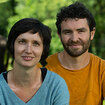Maryse and Fred
Fred and Maryse, seed multipliers in Saône-et-Loire
 Maryse and Fred's beautiful adobe farmhouse in southern Saône-et-Loire, completely renovated by Maryse and Fred, seems to fit in perfectly with the landscape of southern Burgundy, with its lush green lawns and ancient appearance. This hilly plateau has long been renowned as a breeding area. "We, too, have long taken advantage of this watered microclimate to raise Normandy cows classified as 'too fat' because of the quality of the grass," laughs Fred, looking at his three hectares of meadow now given over to the neighbor's Aubrac cows. "On the other hand, our cows have never eaten a single seed. The seeds were for Kokopelli," Maryse continues, smiling at him.
Maryse and Fred's beautiful adobe farmhouse in southern Saône-et-Loire, completely renovated by Maryse and Fred, seems to fit in perfectly with the landscape of southern Burgundy, with its lush green lawns and ancient appearance. This hilly plateau has long been renowned as a breeding area. "We, too, have long taken advantage of this watered microclimate to raise Normandy cows classified as 'too fat' because of the quality of the grass," laughs Fred, looking at his three hectares of meadow now given over to the neighbor's Aubrac cows. "On the other hand, our cows have never eaten a single seed. The seeds were for Kokopelli," Maryse continues, smiling at him.
It's in this cheerful atmosphere that we discover the interior of their home. Earthen partitions, cork base insulation, a wooden bookcase with an undulating design; all surrounded by earthen walls, a beautiful light-colored earth, without any pigments. "To renovate the house, I didn't have to look far. The clay lies 30 cm underground, all around the house. There are even veins of green clay. On the other hand, while all the self-builders envy us, the farmers feel sorry for us. Nobody grows vegetables around here. How many times have I had to go and get the neighbor to help me get the tractor out of the mud? "

This rather spectacular hydromorphy, responsible for root rot, required Maryse and Fred to be very familiar with their 6,000 m2. They weren't able to apply to the letter all the fascinating things they'd learned from agroecologist Pierre Rabhi, soil microbiologists Claude and Lydia Bourguignon and the other instructors at the former Beaujeu Agrobiological School set up by Suzanne and Victor Michon. "No single method was suited to our particular situation. We had practiced animal traction on the school farm, where we worked for a year. We started to apply it at home with a Comtoise draught mare, and we noticed that our plants suddenly grew. Only in winter, Gamine would ravage one hectare by grazing and another with her paws. We carried out a number of other tests, including using the cultivator during the recommended planting period when the soil was saturated with water. But here, apparently the soil is only ready to be worked when it manages to dry out. "

After 20 years of production, Fred and Maryse can finally talk about balance. They know when and how to work the soil, and their incredible productions attest to this harmony. Aisles of agastache, cosmos and hibiscus rub shoulders with those of ipomoea, nigella and poppy. Not to mention the lettuces under cover, whose tops Fred tiptoes to attach to the growing supports, and the "Violet de Gournay" radish bush they both sneak into for the seed harvest.
2017 was the year the cultivated plot was rotated with the meadow, which enriched the soil for four years. "This year was perfect, it didn't rain too much, we were able to pass the cultivator several times between February and April, a month earlier than usual. I was even prepared to harvest three times as many 'Cantaloup' melon seeds and enjoy them from the beginning of July", explains Maryse. Except that, once again, the weather didn't cooperate. In the early days of July, for the first time in 90 years, the neighbor saw a horizontally-loaded hailstorm of such intensity that the earthen walls were scarred.

Since then, the "Black Amber Cane" sorghum has gradually recovered, but some of the cucurbits with their riddled leaves are struggling to keep going. Fred is still trying to apply clay dressings to the biggest wounds, but has decided to harvest the most damaged ones to save some of the seed. The old sheepfold, now converted and reserved for sorting and drying, is already buzzing with the sound of the saw plunging into the heart of the "Nimba" zucchinis.
Fortunately, that's not going to stop Maryse and Fred from laughing out loud and continuing to think about improvements. This year, they tested planting on tarpaulin, laid directly on the mown grass, to better manage "panic". These herbaceous or woody plants can grow to 20 to 40 cm and create a real "panic" in the garden. Walking along the paths alongside the "Persian carpet" (Zinnia), we are regularly overtaken by the ride-on mower, which cuts the future fresh mulch of the "Arc en Ciel" corn. Another new technique being tested this year. "In our desire to be self-sufficient, we started with mixed farming. We ate our own butter and cream, had our own cows, sheep, poultry and vegetables... All we bought was grain and oil," laughs Maryse. Fred was a sheep-shearer and lumberjack. With the house to renovate, that was a lot. Since 2014, we've refocused solely on seed. "
Stars light up in Maryse's eyes when she talks about the famous trip to India that revealed to her that she needed to work the land. After six months' training at the School of Agroecology, she learned about seed production from Pascal and Véronique Naudin, who now run Essem'bio. "For several years now, we've been looking to offer training days and welcome trainees. With passion, transmission comes naturally. "It's true that when you see the marvels that thrive on this soil, where, according to laboratory analyses, only grass can grow, it really makes you want to stay and discover all the techniques of these seed enthusiasts.
Video: Meet Maryse and Fred!








